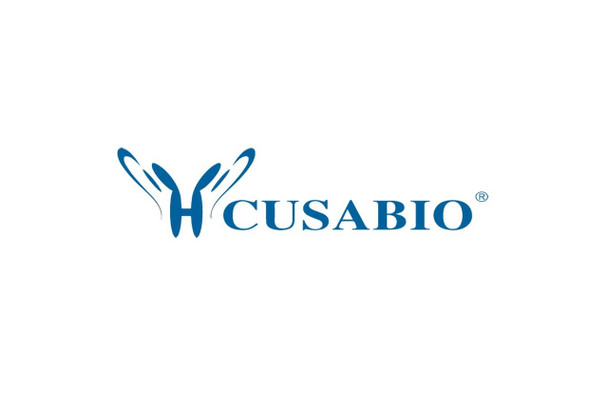Cusabio Human Recombinants
Recombinant Human StAR-related lipid transfer protein 7, mitochondrial (STARD7), partial | CSB-EP865111HU1
- SKU:
- CSB-EP865111HU1
- Availability:
- 13 - 23 Working Days
Description
Recombinant Human StAR-related lipid transfer protein 7, mitochondrial (STARD7), partial | CSB-EP865111HU1 | Cusabio
Alternative Name(s): Gestational trophoblastic tumor protein 1START domain-containing protein 7 ;StARD7
Gene Names: STARD7
Research Areas: Signal Transduction
Organism: Homo sapiens (Human)
AA Sequence: LWRRLHGRPGHASALMAALAGVFVWDEERIQEEELQRSINEMKRLEEMSNMFQSSGVQHHPPEPKAQTEGNEDSEGKEQRWEMVMDKKHFKLWRRPITGTHLYQYRVFGTYTDVTPRQFFNVQLDTEYRKKWDALVIKLEVIERDVVSGSEVLHWVTHFPYPMYSRDYVYVRRYSVDQENNMMVLVSRAVEHPSVPESPEFVRVRSYESQMVIRPHKSFDENGFDYLLTYSDNPQTVFPRYCVSWMV
Source: E.coli
Tag Info: N-terminal GST-tagged
Expression Region: 61-307aa
Sequence Info: Partial
MW: 56.5 kDa
Purity: Greater than 90% as determined by SDS-PAGE.
Relevance:
Reference: Generation and annotation of the DNA sequences of human chromosomes 2 and 4.Hillier L.W., Graves T.A., Fulton R.S., Fulton L.A., Pepin K.H., Minx P., Wagner-McPherson C., Layman D., Wylie K., Sekhon M., Becker M.C., Fewell G.A., Delehaunty K.D., Miner T.L., Nash W.E., Kremitzki C., Oddy L., Du H. , Sun H., Bradshaw-Cordum H., Ali J., Carter J., Cordes M., Harris A., Isak A., van Brunt A., Nguyen C., Du F., Courtney L., Kalicki J., Ozersky P., Abbott S., Armstrong J., Belter E.A., Caruso L., Cedroni M., Cotton M., Davidson T., Desai A., Elliott G., Erb T., Fronick C., Gaige T., Haakenson W., Haglund K., Holmes A., Harkins R., Kim K., Kruchowski S.S., Strong C.M., Grewal N., Goyea E., Hou S., Levy A., Martinka S., Mead K., McLellan M.D., Meyer R., Randall-Maher J., Tomlinson C., Dauphin-Kohlberg S., Kozlowicz-Reilly A., Shah N., Swearengen-Shahid S., Snider J., Strong J.T., Thompson J., Yoakum M., Leonard S., Pearman C., Trani L., Radionenko M., Waligorski J.E., Wang C., Rock S.M., Tin-Wollam A.-M., Maupin R., Latreille P., Wendl M.C., Yang S.-P., Pohl C., Wallis J.W., Spieth J., Bieri T.A., Berkowicz N., Nelson J.O., Osborne J., Ding L., Meyer R., Sabo A., Shotland Y., Sinha P., Wohldmann P.E., Cook L.L., Hickenbotham M.T., Eldred J., Williams D., Jones T.A., She X., Ciccarelli F.D., Izaurralde E., Taylor J., Schmutz J., Myers R.M., Cox D.R., Huang X., McPherson J.D., Mardis E.R., Clifton S.W., Warren W.C., Chinwalla A.T., Eddy S.R., Marra M.A., Ovcharenko I., Furey T.S., Miller W., Eichler E.E., Bork P., Suyama M., Torrents D., Waterston R.H., Wilson R.K.Nature 434:724-731(2005)
Storage: The shelf life is related to many factors, storage state, buffer ingredients, storage temperature and the stability of the protein itself. Generally, the shelf life of liquid form is 6 months at -20?/-80?. The shelf life of lyophilized form is 12 months at -20?/-80?.
Notes: Repeated freezing and thawing is not recommended. Store working aliquots at 4? for up to one week.
Function: May play a protective role in mucosal tissues by preventing exaggerated allergic responses.
Involvement in disease:
Subcellular Location: Mitochondrion
Protein Families:
Tissue Specificity: Expressed in nasal epithelial cells. Down-regulated in nasal epithelial cells in patients experiencing an asthma exacerbation as compared to stable asthmatics and healthy controls.
Paythway:
Form: Liquid or Lyophilized powder
Buffer: If the delivery form is liquid, the default storage buffer is Tris/PBS-based buffer, 5%-50% glycerol. If the delivery form is lyophilized powder, the buffer before lyophilization is Tris/PBS-based buffer, 6% Trehalose, pH 8.0.
Reconstitution: We recommend that this vial be briefly centrifuged prior to opening to bring the contents to the bottom. Please reconstitute protein in deionized sterile water to a concentration of 0.1-1.0 mg/mL.We recommend to add 5-50% of glycerol (final concentration) and aliquot for long-term storage at -20?/-80?. Our default final concentration of glycerol is 50%. Customers could use it as reference.
Uniprot ID: Q9NQZ5
HGNC Database Link: HGNC
UniGene Database Link: UniGene
KEGG Database Link: KEGG
STRING Database Link: STRING
OMIM Database Link: OMIM









